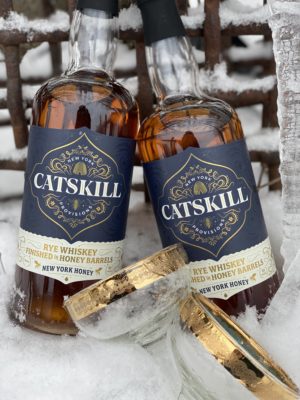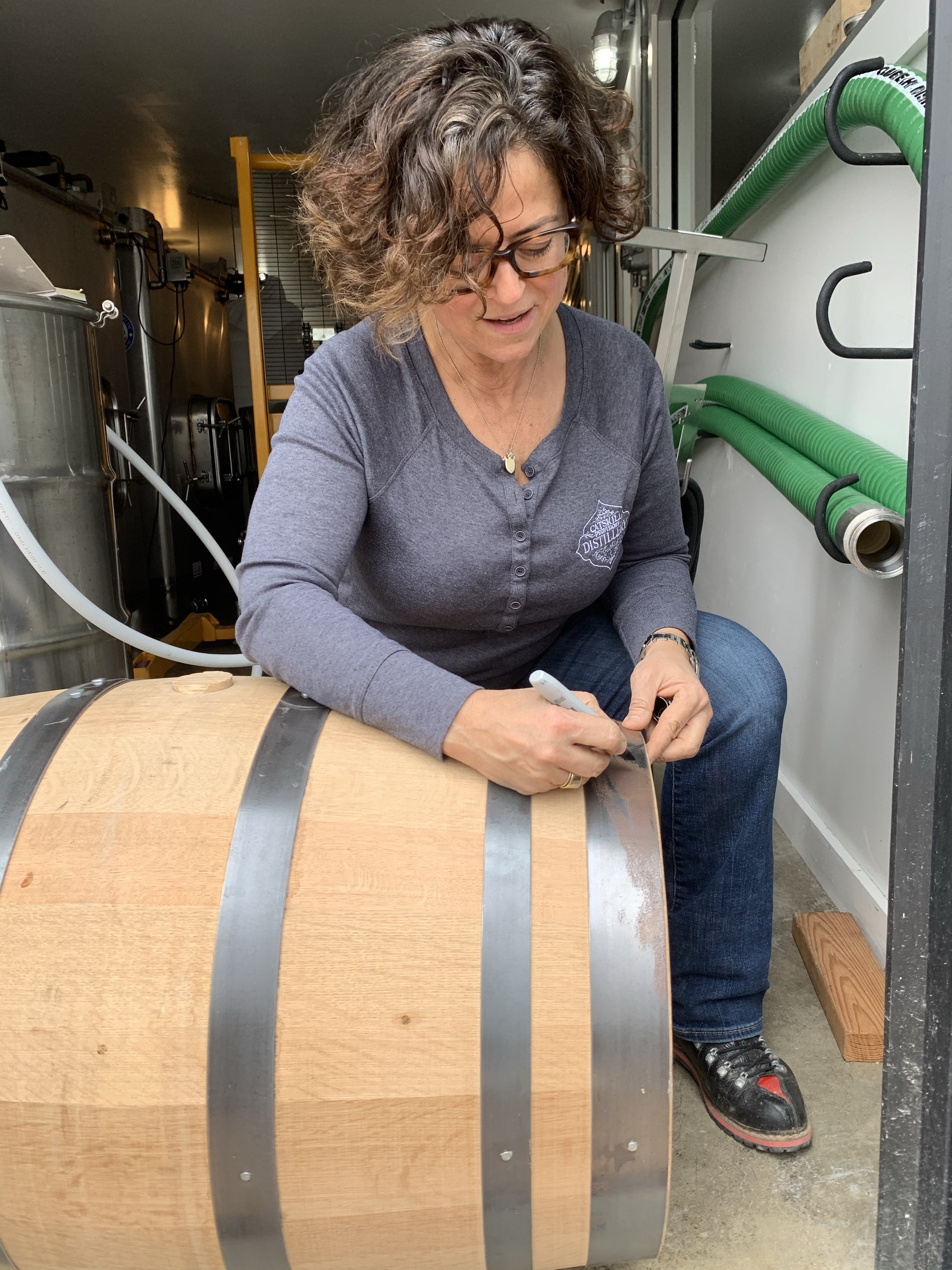
Photo Credit: Catskills Provisions
The San Francisco World Spirits Competition held its prestigious 20th annual judging in March, and the record-breaking year featured almost 3,000 entries from around the world. Long Eddy, NY-based Catskills Provisions was one of the entrants in the Best Flavored Whiskey category with its New York Honey Rye Whiskey — and it won.
Owner Claire Marin has taken quite the literal and metaphorical journey into the world of distilling with honey and beekeeping. Beekeeping began as a hobby in 2003 to get away from the stress of working in New York City as a vice president publisher of the seventh biggest magazine in the country. “I gave a beekeeping kit to my partner, and that’s how it truly started,” Marin said. “I became enamored, obsessed with it. Beekeeping became this connection to nature, to upstate, to the Catskills.”
She would spend her weekends “so into the bees,” which transported her to a place void of stress and self-doubt. By 2010 she had resigned from her job in publishing, picked some honey jar labels out and turned beekeeping into a full-fledged business, founding Catskill Provisions.
At that time craft distilling was taking off, and the Catskills are a great place to grow rye. Add that to late-summer wildflower honey as the feature ingredient, and you have the award-winning Honey Rye Whiskey, which possesses flavor notes of toffee, burnt orange peel and golden raisin.
Getting to the final product took a lot of trial and error over a four-year period. Marin said the tendency is to go for heavy honey, and she wanted more of a nuanced taste of honey for this whiskey. She didn’t want it to be too sweet, and she also wanted the whiskey to be 80 proof.
“Most alcohols that have any flavor are 70 proof. I didn’t want it to be a sissy drink — I wanted it to be a whiskey drinker’s drink. But at the same time, I wanted to soften it. It wasn’t until 2017 until I had the formula I thought was good,” she said.
Marin then started entering competitions, but she didn’t think she was ready for San Francisco until this year. She finished the whiskey in honey barrels, aging the rye.
“We use about 20 pounds of honey in a 53-gallon barrel of whiskey. I want the flavor of the rye to come through; there are natural honey notes in rye, and some more than others. New York rye happens to have a lot of spice to it, so it balances the sweetness of the honey, and it blends perfectly because of the natural honey notes. You aren’t forcing the flavor; it makes it a good sipping whiskey,” Marin said. “The double gold win at the World Comp is very important. Every one of the 50 judges gave it a gold. Finally, honey gets its due merit in spirits!”

One of the things that Marin loves about the honey whiskey is that she gets to cut the sugar out of the recipe, making for a drier old fashioned, for example. You get to taste the whiskey in the drink, thanks to the spicy, complex, hot rye, which is perfect for the honey.
“I love the fall or late-summer honey. It’s spicy and dark in color, a lot of buckwheat. Knotweed grows along the Delaware river and the bees love it; it creates a complex, flavorful honey. I experimented with a lot of seasonal honeys before I came to this one that goes well with the rye,” Marin said.
Marin loves New York Honey Whiskey with a dash of amaro and a twist of orange. As for customers? The old fashioned always wins. Add a few drops of your favorite bitters, a twist of orange, omit the sugar cube. Even the cherry is optional.
“It’s such a nice, well-rounded, complex whiskey. With the honey, it’s great. When I do tastings, I give customers choices and they love that one, hands down,” Marin said.
New York Honey Whiskey’s award at the World Spirits Competition is the culmination of years of hard work in a male-dominated industry. Being a newcomer to the craft distilling world in 2013, Marin said that she was struggling with wanting to develop her own recipe and allowing other people to help.
“I held myself back for a long time. Back then, only three craft distilleries were run by women. That number has risen a lot, but we’re under 1% of the 2,400 craft distilleries in the United States,” she said. “As women we bring a lot of innovation to the industry, creativity in the flavor profiles, and it’s been very positive. I now have very good relationships with other distillers.”
Marin also released pollinator vodka and pollinator gin both made from non-GMO corn and honey. She adds honey to the fermentation process, and no honey is added after distillation.
“It’s really good. It gives it sort of a silky mouthfeel — it has a noticeable flavor and aroma to it,” she said.
As for the bees? Marin still adores beekeeping and tends to about eight beehives on the property where the distillery is in Long Eddy — also serving as the location of the pollinator sanctuary she’s preparing. There are over 300 hives altogether, and Marin has collected tons of milkweed seeds last year.
“They’re amazing for pollinators and for monarch butterflies. Bees love those flowers, and I’m in the process of planting an enormous amount of pollinator flowers on four acres. We also plant clover and buckwheat,” she said. “Bees respond well to kind treatment, and the best honey comes from happy bees. Bees are a place of strength and a connection to nature. I felt like that said a lot about me. I’m a happy bee now, so things are so much better.”
For more information about the made with honey spirits line, visit www.NYHoneyRyeWhiskey.com and spirits.catskillprovisions.com.
